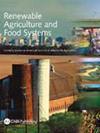气候变化对非洲农业生产力关系的非参数分析:对粮食安全的影响
IF 2
3区 农林科学
Q2 AGRICULTURE, MULTIDISCIPLINARY
引用次数: 1
摘要
摘要早期的研究在很大程度上忽略了气候变化对非洲农业全要素生产率增长的影响。这项研究显示了气候投入如何影响TFP增长以及其他生产力增长指标和指标,以及它们如何作为生产力驱动因素影响整体投入效率。我们使用了1999年至2019年由42个非洲国家组成的小组和非参数数据包络分析Malmquist技术。非参数分析显示,非气候诱导的全要素生产率估计值的平均增长率为1.9%,而气候诱导的总要素生产率估计数的平均增长速度为2.4%。分别考虑温度和降水量,全要素生产率平均增长2.3%。这一增长率(2.3%)略低于温度和降水的综合影响(2.4%),但高于忽略气候变量的典型TFP增长率(1.9%),表明如果忽略气候投入,非洲农业的TFP增长有被低估的风险。我们还发现,气候影响的分布在各个地区各不相同。例如,在北非,由于该地区气温上升,气温导致的全氟辛烷值增长率为负。TFP估算的分解证据表明,气候变量也影响生产力的决定因素。然而,技术改进对于减轻极端天气投入对非洲农业全要素生产率增长的影响至关重要。因此,提供了一些政策建议,以帮助决策者应对气候变化对非洲农业全要素生产率增长的影响,并确保粮食安全。该研究主张重新评估气候-农业效应,以充分理解气候因素的作用及其对非洲农业全要素生产率增长的贡献。本文章由计算机程序翻译,如有差异,请以英文原文为准。
A nonparametric analysis of climate change nexus on agricultural productivity in Africa: implications on food security
Abstract Earlier research largely ignored the effects of climate change on the growth of agricultural total factor productivity (TFP) in Africa. This study shows how climate inputs impact TFP growth in addition to other productivity growth indicators and metrics, as well as how they can impact overall input efficiency as productivity drivers. We use a panel of 42 African nations from 1999 to 2019 and a nonparametric data envelopment analysis-Malmquist technique. The non-parametric analysis revealed that the average growth rate of the non-climate-induced TFP estimates was 1.9%, while the average growth rate of the climate-induced TFP estimates was 2.4%. Accounting for temperature and precipitation separately, TFP grew by 2.3% on average. This growth rate (2.3%) is slightly less than the combined effect of temperature and precipitation (2.4%) but higher than the typical TFP growth rate (1.9%) that ignores climate variables, indicating that TFP growth in African agriculture risks being underestimated when climate inputs are ignored. We also find the distribution of the climate effects to vary across regions. In northern Africa, for example, the temperature-induced TFP growth rates were negative due to rising temperature in the region. Evidence from the decomposed TFP estimates indicates that climate variables also influence productivity determinants. However, technology improvement is fundamental to mitigating the effects of extreme weather inputs on TFP growth in Africa's agriculture. As a result, a few policy suggestions are provided to help policymakers deal with the effects of climate change on TFP growth in Africa's agriculture and ensure food security. The study advocated for a reevaluation of the climate–agriculture effect in order to fully comprehend the role of climate factors and their contributions to agricultural TFP growth in Africa.
求助全文
通过发布文献求助,成功后即可免费获取论文全文。
去求助
来源期刊

Renewable Agriculture and Food Systems
农林科学-农业综合
CiteScore
5.20
自引率
7.40%
发文量
39
审稿时长
>36 weeks
期刊介绍:
Renewable Agriculture and Food Systems (formerly American Journal of Alternative Agriculture) is a multi-disciplinary journal which focuses on the science that underpins economically, environmentally, and socially sustainable approaches to agriculture and food production. The journal publishes original research and review articles on the economic, ecological, and environmental impacts of agriculture; the effective use of renewable resources and biodiversity in agro-ecosystems; and the technological and sociological implications of sustainable food systems. It also contains a discussion forum, which presents lively discussions on new and provocative topics.
 求助内容:
求助内容: 应助结果提醒方式:
应助结果提醒方式:


